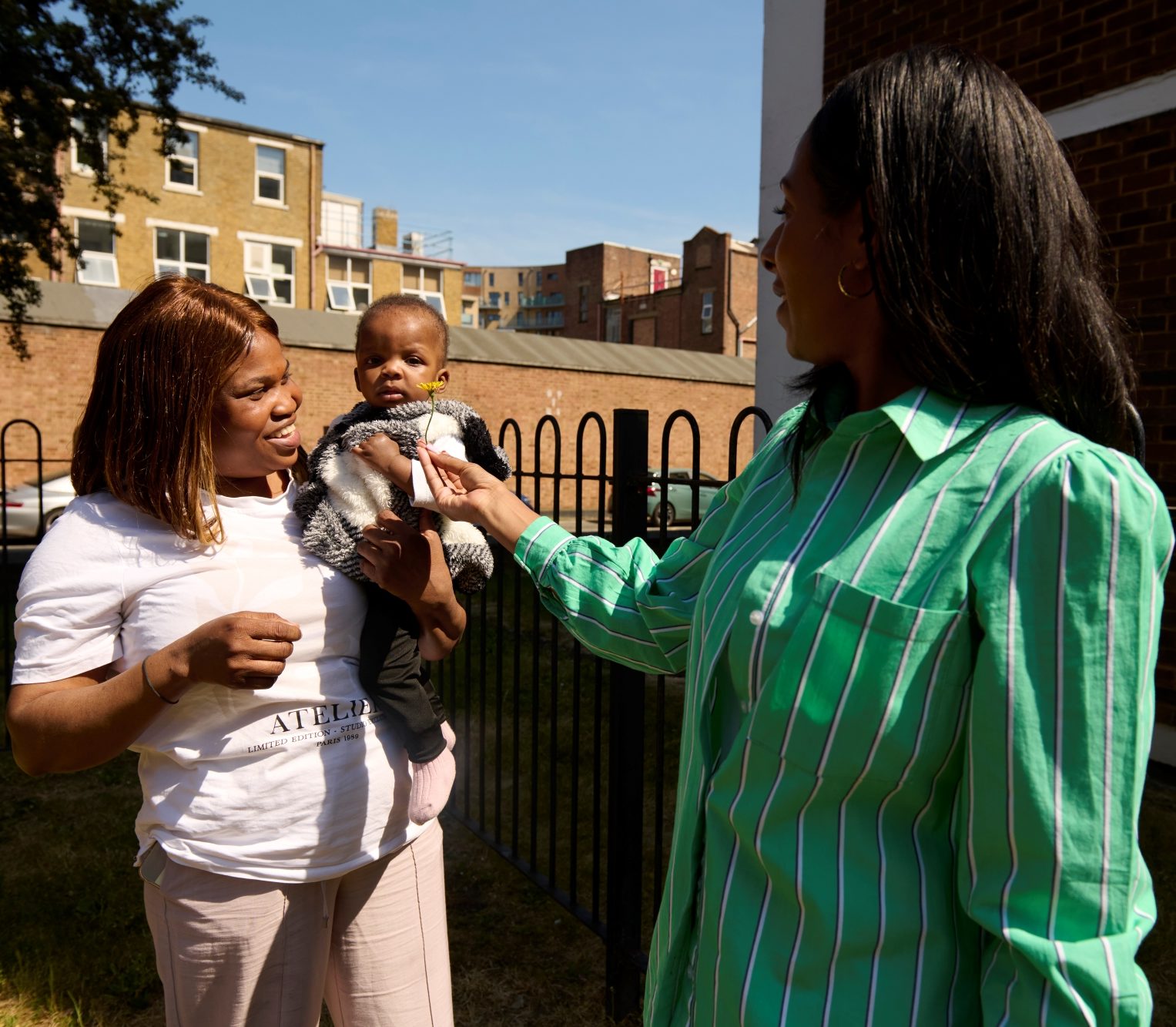
Early Years Grants Programme
Supporting Families from the Start
Words by Sarah Myers
Photography by Callum Toy
It’s so nice to see Mary* laugh,” says Kelly*, “because when I first met her, she cried a lot. Seeing her with her baby, smiling like this, makes me feel really fulfilled.”
Kelly is a volunteer at the family support charity Home-Start. She and Mary are part of a programme in Lewisham where trained volunteers provide emotional and practical help to families with children under five, who are having difficulties with managing parenting. This could be for any of a number of reasons, including illness, financial worries or because the parent doesn’t have the support of family and friends.
“If a mum is in a vulnerable position, stuck in a situation with no help or support, that affects the development of a child,” says Kelly. “When I first met Mary, she wasn’t in a good place. I was able to encourage her and share parts of my own experience. I’d say to her, ‘Look, I’ve felt like you before, and this is where I am now, helping you. It’s not going to be like this forever.’”
Mary was introduced to Home-Start by her health visitor. Her baby, Bea*, turned one in August 2025 and she has a 14-year-old daughter who has special educational needs. “I’m a lone parent. I was lonely and bored,” says Mary. “A lot of things were going on for me. When the health visitor said she could introduce me to Home-Start, I told her, ‘I don’t mind, if it’s going to be of help to me’. And thank God she did.”
A Home-Start family support coordinator matches volunteers like Kelly with families like Mary’s. They decide together what support is needed, and help parents to build the skills and confidence required to advocate for themselves. Mary and Kelly spent time getting to know each other. They went for walks and, together, made Mary and her children appointments with the GP and dentist – things that she had found difficult to do on her own. Now they’re visiting children’s centres to find somewhere that Mary and Bea will both enjoy attending.
“Getting out has been good,” says Kelly. “Bea has really come out of herself being around other children. She’s enjoying the sensory stimulation; I can see she’s really growing.”
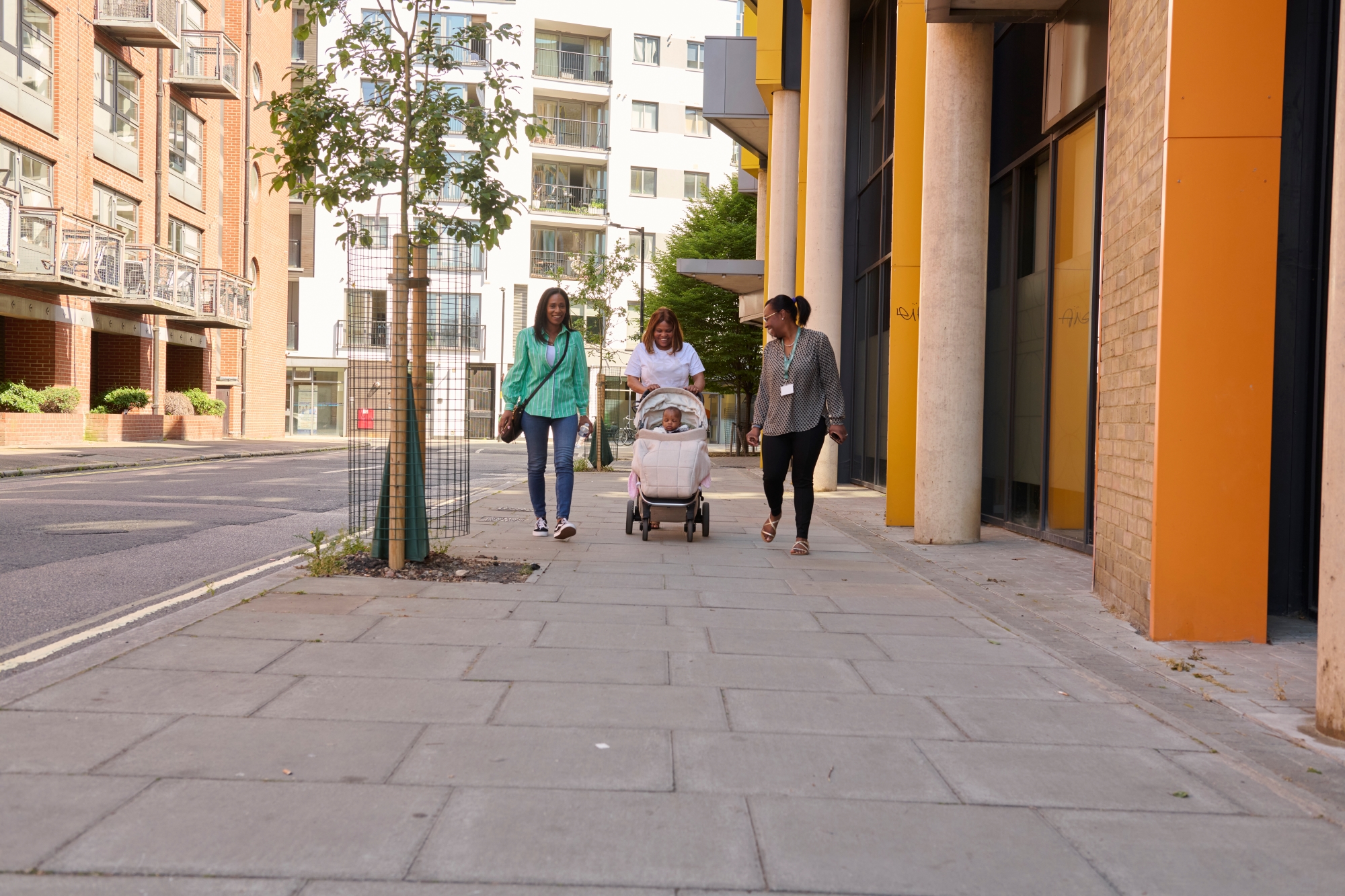 Home-Start volunteer with mum and baby
Home-Start volunteer with mum and baby
Kelly has also been encouraging Mary to play more with Bea when they’re at home together. She’s brought round a bag of sensory toys and books provided by Home-Start.
“We do fun things together with the children, including a lot of modelling play**. This helps Mary when I’m not there,” says Kelly. “She interacts with the children differently now. All Mary wanted was for her children to be happy and settled – what we all want for our children.”
Mary thinks that Kelly’s support has made a huge difference to her family. “It feels good to see how Bea has changed. And I feel so relaxed now,” she says. “Kelly brought me out of the shell where I was. In the future I’d like to learn to help others, to give back. Because Kelly really helped me.”
Research shows that the first 1,001 days of a child’s life have a fundamental impact on their future.
Reaching more families, earlier
There are around 180 local, independent Home-Starts across the UK. The Leathersellers’ Foundation and Merchant Taylors’ Foundation’s Early Years Programme grant is supporting Home-Start Southwark to expand its work into Lewisham. All of Home-Start’s work is rooted in the belief that the earliest years make the biggest impact – the key driver behind the grant programme.
“Our research shows that a child’s brain is 80% developed by the age of two,” says Jane Hindle, Education Manager at Merchant Taylors’ Foundation, ”which is why the programme focuses on families with nought to three-year olds. We know that the skills and confidence developed in those years lay the foundations not only for formal education but for lifelong learning and well-being.”
This partnership is the first time that The Leathersellers’ Foundation has focused on the early years. It’s part of a strategic shift to supporting organisations throughout the educational journey. “There’s a cumulative effect of disadvantage in educational achievement,” says Natalia Rymaszewska, the Foundation’s Head of Grants. “Focusing support on the early years can help to break a cycle of intergenerational disadvantage and be a driver of social mobility.”
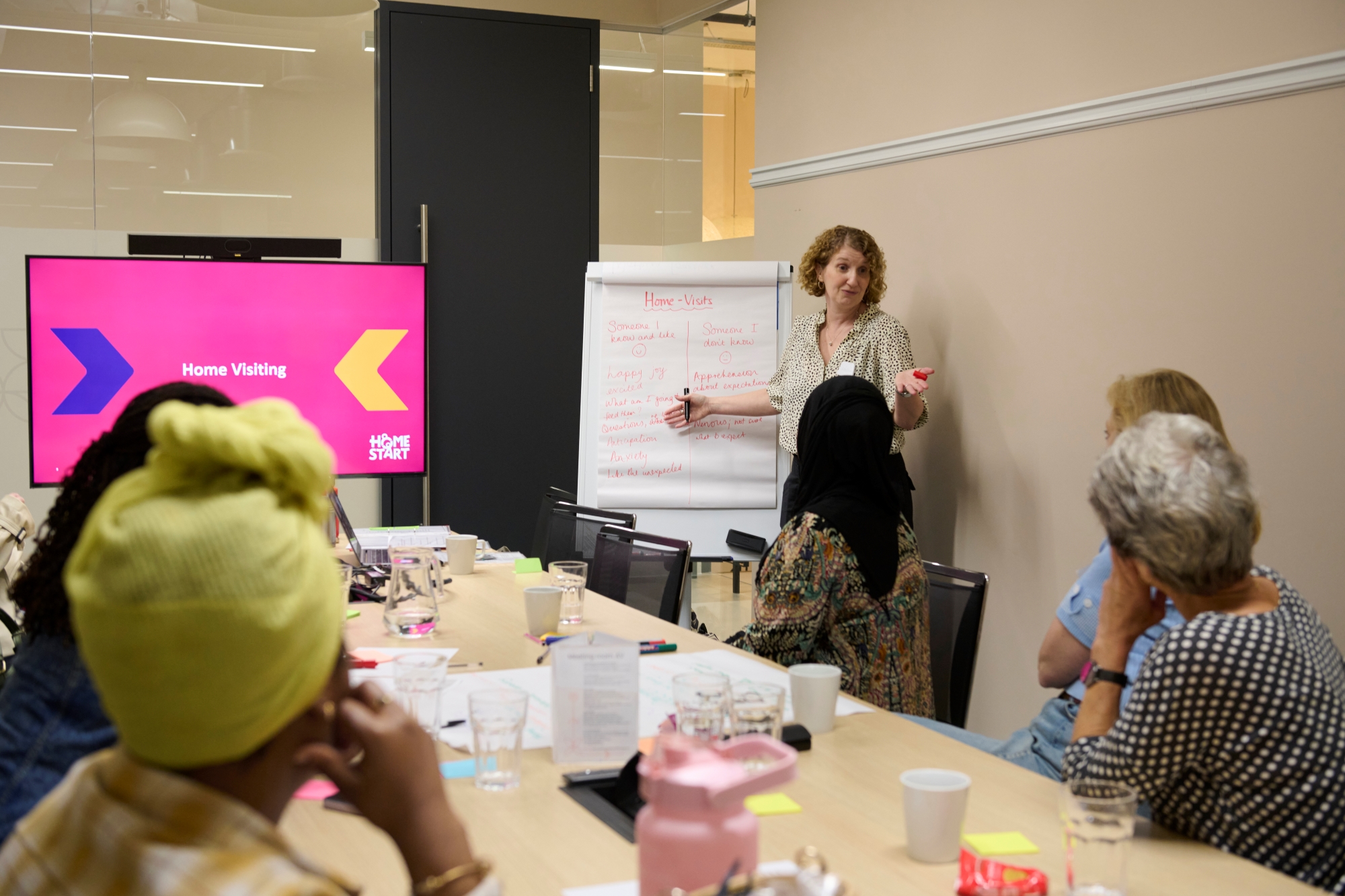 Home-Start volunteer training
Home-Start volunteer training
Organisations receiving the two-year grants have the added benefit of becoming part of a network of early years charities that can share expertise. The five grantees meet twice a year. Becca Jones, CEO of Home-Start Southwark, says she’s enjoyed getting to know other leaders from the charities. “We support each other and compare notes. It massively benefits the families we support too, because we know more about what other local projects are doing and can refer to them.”
One of the other Early Years grantees Becca has connected with is the National Literacy Trust. Their First Words Together programme in Lewisham supports babies and toddlers under two with speech, language and communication. The programme involves training and peer support for early years practitioners, who then deliver a series of activities at their nursery. The National Literacy Trust also provides books and resources for parents and carers so that they can continue to support their children’s development at home. First Words Together has already run in Birmingham and Cornwall, and thanks to the Early Years grant, it’s being delivered in London for the first time.
Holly Muldowney, Programme Manager of Early Years at the National Literacy Trust, says that First Words Together is addressing a gap in language and literacy provision. “There tends to be a heavy emphasis on children being prepared for school, which has led to this gap for the very early years,” she says. “Yet we know that the first 1001 days are the most significant time in child development. Even if your baby isn’t talking, it doesn’t mean that they’re not communicating or absorbing everything around them.”
Working with speech and language therapists, the National Literacy Trust developed First Words Together to communicate the importance of everyday interactions to parents and caregivers. The programme supports practitioners to understand and share how engagement, activity and routines will have a positive impact on the youngest children.
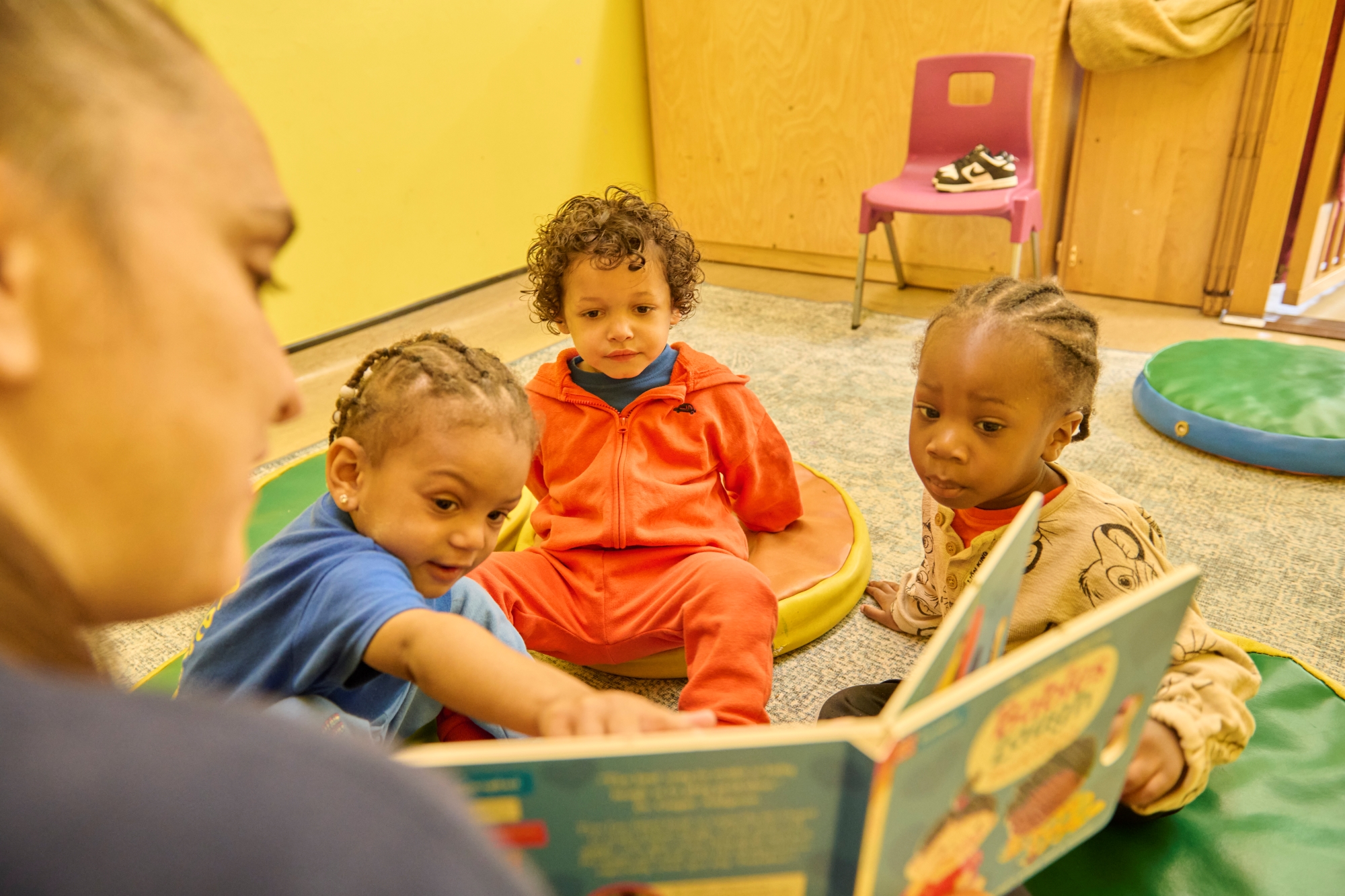 Early years practitioner reading to children as part of the National Literacy Trust's First Words Together programme
Early years practitioner reading to children as part of the National Literacy Trust's First Words Together programme
Connecting parents and practitioners
Rochelle Palmer is a nursery assistant in the baby room at the Base Zero nursery in Bellingham, one of the first nurseries in Lewisham to take part in First Words Together.
“We’re with the babies when they’re first learning how to communicate, verbally and nonverbally,” says Rochelle. “On the training, we discussed what we can do to encourage babies to build their communication and to feel confident to express themselves, whether that’s through actions, facial expressions, trying to say words or just experimenting with sounds, like babbling.”
First Words Together helps practitioners like Rochelle support parents to create a good ‘home learning environment’, where they can continue what happens at nursery. Rochelle says the ideas from the programme can easily be worked into a parent and child’s day-to-day routine, such as singing a song at bathtime or naming items together as they unpack shopping. “We know that parents are really busy,” says Rochelle. “When we give them tips, we look at things they’re already doing and how they can stretch those further. That’s where the free resources and books can help.”
Each week, families are gifted a book that links with the First Words Together session. By the end of the programme, they have built mini libraries in their homes. Families also get a postcard with a talking tip, such as ‘Be face to face with your child’, as this helps parents and children to look at and listen to each other. There’s a related activity to try, such as playing peek-a-boo and helping their child to join in the game. Parents are asked to comment on the back of the postcard about how the activities have gone and share feedback with their nursery practitioner. Rochelle says that this feedback has helped her to build rapport with the parents and allowed them each to understand better where the child is with language and communication.
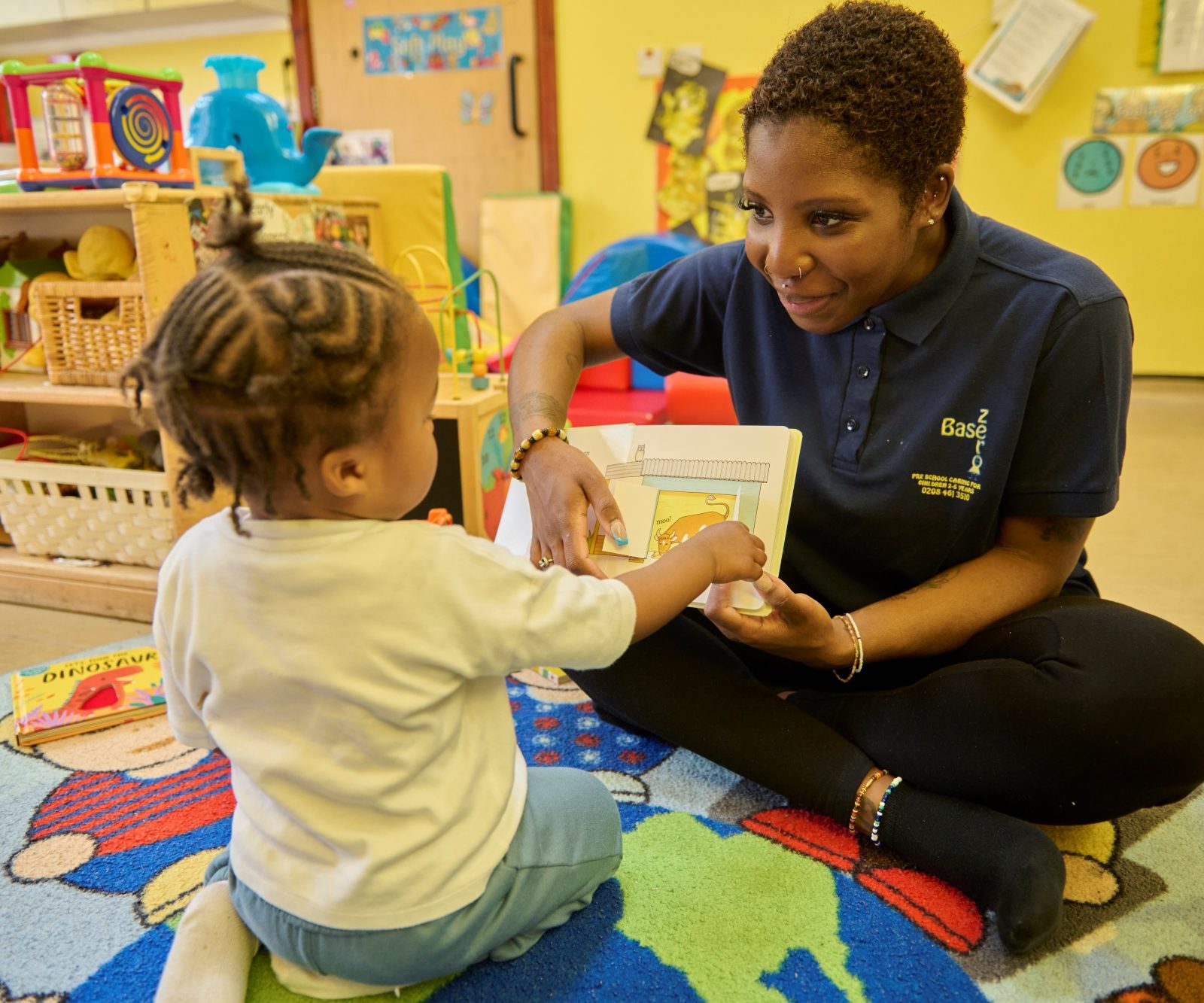 The National Literacy Trust deliver their 'First Words Together' programme in a nursery as part of the Early Years Programme
The National Literacy Trust deliver their 'First Words Together' programme in a nursery as part of the Early Years Programme
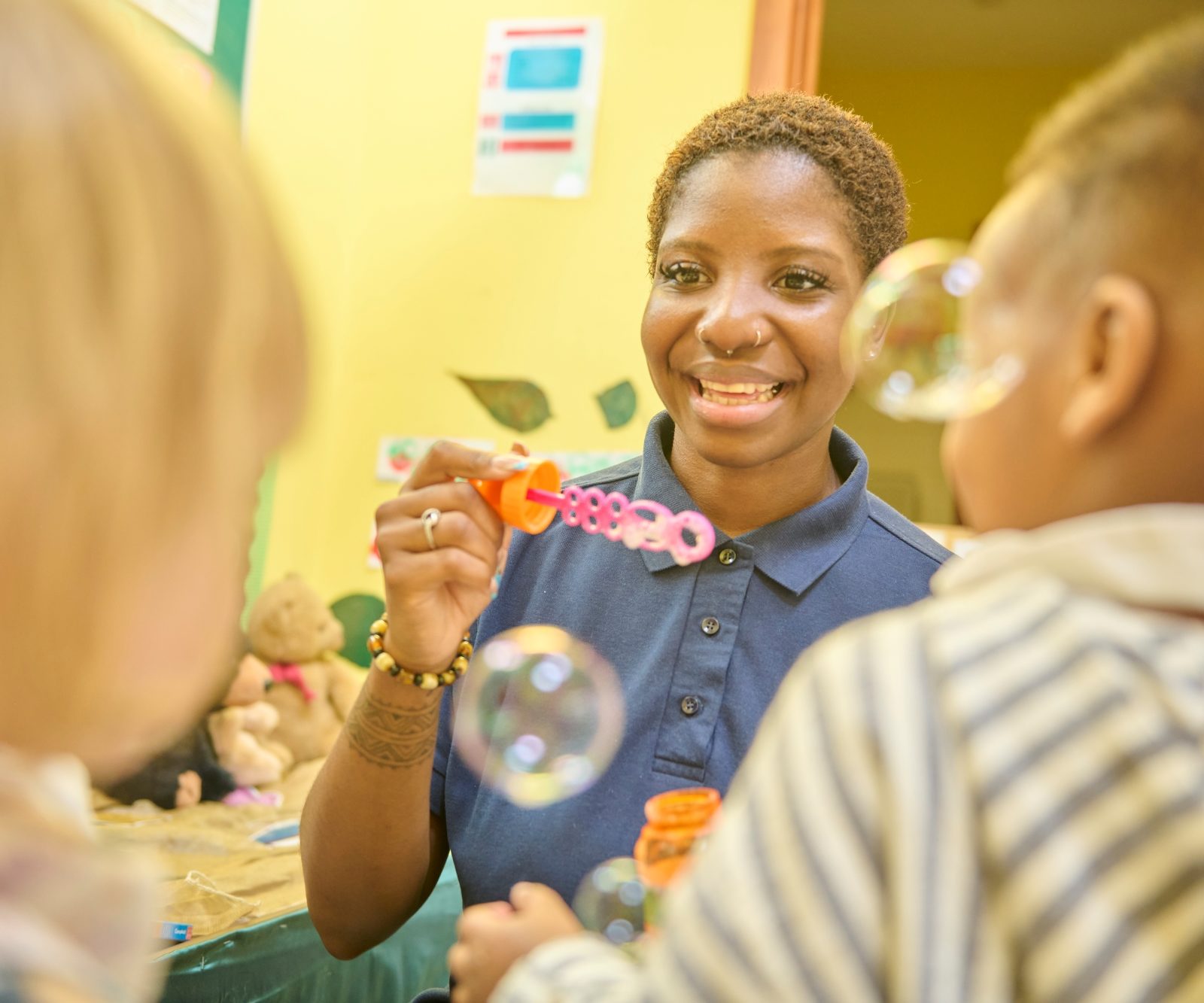
Comments from parents on the resources have been extremely positive. One said, “Our son now asks to read stories every night. His ability to express feelings and speak clearly has improved significantly. This programme really helped us build a better reading habit with him.” Another stated that the picture books were really helpful and, also, the parent postcards, which helped them to bond with their child.
Of the parents who completed a survey, 94% felt that they now know more about supporting their child’s early language and are more confident with engaging in activities to support it. The programme received equally positive feedback from nursery practitioners, with 100% of those who submitted a delivery log noticing benefits and changes in children’s communication skills from taking part in the programme.
“I’ve seen a significant change with at least four out of five babies,” says Rochelle. “I was shocked when I heard them expressing themselves so confidently, singing along during our circle time, or trying to indicate something to me, even when they don’t know how to say it yet. People sometimes underestimate what children can learn and understand. But when you have that focused time, you see that the babies’ comprehension is incredible.”
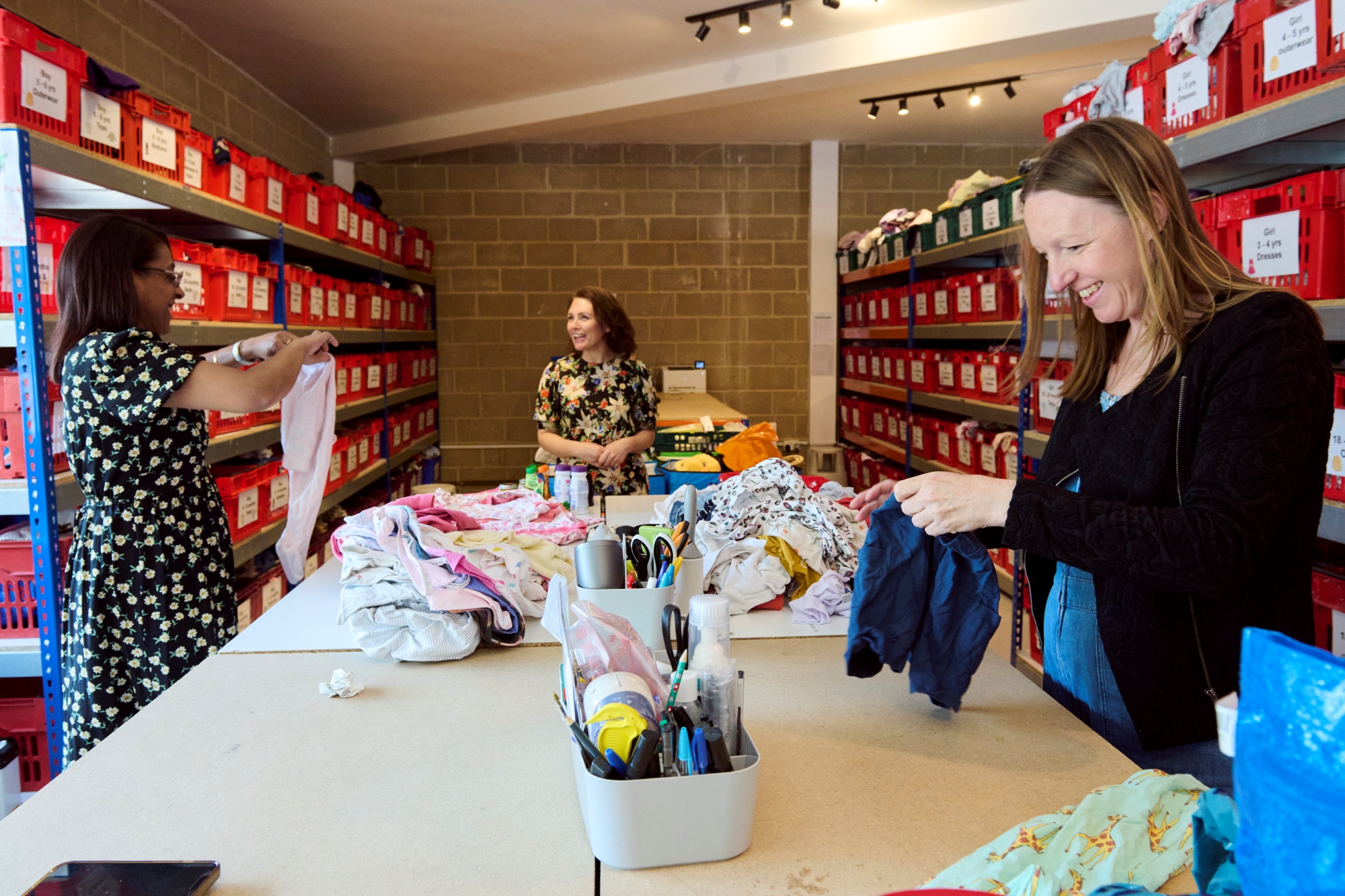 MammaKind team members sorting clothes for the baby bank
MammaKind team members sorting clothes for the baby bank
Collaborating for impact
It’s the first time that the National Literacy Trust has worked in the Lewisham area, and being part of the Early Years Programme has introduced them to other local grantees. Thanks to a chat in the car park after one of the grant partners’ meetings, they now donate books and resources to a project for young mothers run by the MammaKind baby bank.
MammaKind provides clothes, toys, baby equipment, essential hygiene items and baby food to families experiencing poverty in the London boroughs of Bromley, Bexley, Greenwich and Lewisham. The majority of the families that they support are headed by a single mother, and many have experienced homelessness or violence, or are refugees with no recourse to public funds.
“If your baby doesn’t have a safe place to sleep, or access to books and toys, that has a huge impact on their development,” explains Kelly Fort, MammaKind’s Head of Operations. “The clothes, the pram, the toys, they’re not just practical, they are an investment in that child’s future. We had one family where the older child missed over 100 lessons in primary school because mum didn’t have a pram and couldn’t take the baby on the school run. We heard about that on a Friday, the mum had a pram on the Monday. Things like this are vital to stopping the poverty trap. The midwives tell us all the time that MammaKind changes lives.”
The items provided by MammaKind enable parents to attend groups and activities that their children enjoy and that help their development. “I don’t mean to sound like an Instagram post, but our goal is that families don’t just ‘survive’; we want them to thrive,” says Kelly. “For example, parents who’ve received a package from MammaKind might think, ‘Now that I have the towel and the lovely swimsuit, maybe we’ll go to that free children’s swimming class that Home Start is putting on.’”
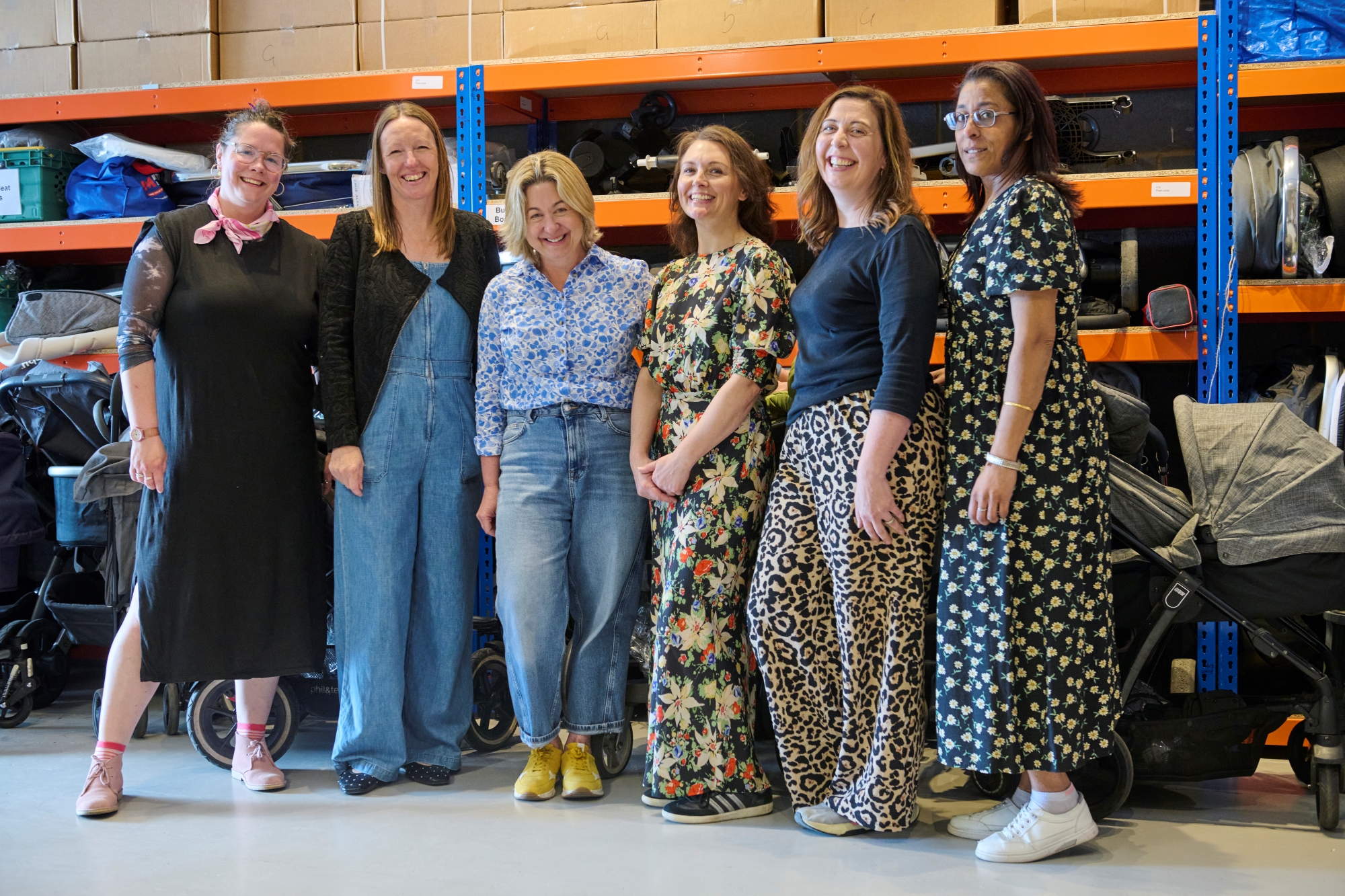 The MammaKind Team
The MammaKind Team
MammaKind provides high-quality items, tailored to a child’s needs, as well as gifts for mums such as high-end beauty products. Kelly says that this care and attention to detail can deepen the trust between a mother and the professionals who’ve referred them to MammaKind. These include health visitors, midwives, children’s centres, schools and charities. “Asking for help can be a very hard thing to do,” says Kelly. “We’ve created a service where we smash through those feelings of shame related to poverty. The feedback we get about our packages is always off the charts.”
Kelly says that meeting and sharing with the other grantees has been “a wonderful experience”. Not only have they been able to share learnings, but everyone around the table now has a connection with MammaKind if they didn’t already.
Kate Bird, Senior Project Manager at the National Literacy Trust, agrees and says that being part of this group of grantees has helped with signposting. “For example, we can make sure our nursery practitioners know about MammaKind and promote them to families,” she says. “Working with a mix of national charities, like ours, and local ones has really helped us to develop a detailed on-the-ground understanding of the borough, such as knowing where the pockets of deprivation are. This Early Years collaboration offers a unique opportunity that strengthens the services local families can access – and will have an even more powerful impact.”
—
The Early Years Programme is a joint initiative between The Leathersellers’ Foundation and Merchant Taylors’ Foundation. It provides grants to charities that support the early years development of children from low-income households in Lewisham, in areas which are often under served by other charities.
The programme has awarded the following five charities a total of £220,000 over two years, with services provided in 2024–2025 and 2025–2026.
Home-Start Southwark and Lewisham
What do they do?
Home-Start provides high-quality support for families with babies and children under five, empowering them to create happier lives for their children.
What’s their approach?
They bring together a community-based team of trained peer volunteers and family support workers to assist parents in challenging circumstances.
What will the grant fund?
Expanding their core service across Lewisham.
MammaKind
What do they do?
MammaKind is a baby bank and parent service. They provide a pack of essentials, including prams and carriers, clothes, toys and books, to help prevent and relieve poverty.
What’s their approach?
They work with a network of referral partners who connect them with families with young children in Lewisham who need support.
What will the grant fund?
Expanding their core service across Lewisham to enable access to educational opportunities for children from low income families.
National Literacy Trust
What do they do?
This national charity empowers people with the literacy skills they need to succeed in life.
What’s their approach?
Their vision for early years is: “Every child starts school with language and communication skills ready to grow and learn at school.”
What will the grant fund?
First Words Together for nought to three-year-olds, which involves training and continued peer support of early years practitioners in the private, voluntary, and independent sector as well as resources for parents.
Early Years Alliance
What do they do?
Early Years Alliance is the largest early years membership organisation in England, working to support young children and their families, particularly in areas of disadvantage.
What’s their approach?
The work they do with Alliance members includes:
– Advocating for children, families and all childcare and early education providers.
– Encouraging safeguard-led practice and raising standards and quality of childcare and early education.
– Providing high-quality training support and advice.
What will the grant fund?
A project in three deprived areas of Lewisham providing play opportunities with professional and peer support available targeted at families whose children have, or are suspected to have, special educational needs and disabilities. Specialist equipment and understanding provides an accessible and enabling environment to help their development.
The Parent Village and St Mark’s and St Luke’s, Downham
What do they do?
The Parent Village provides services to support parents with their mental health, well-being and confidence. Their coaching style course is provided in tandem with enriching weekly ‘stay and play’ sessions for children at the two churches.
What’s their approach?
They help relieve the pressure that parents experience by providing routes to join with other parents, and by offering tools and resources to take positive steps and build a network of support.
What will the grant fund?
Equipment and costs for the stay and play sessions in Downham, alongside group learning opportunities for parents.
* Names have been changed to protect identities
** Modelling play, or observational learning, is a method where children learn by watching and imitating others, particularly adults.
READ MORE

Dream Maker
In her sleep, Frances Pinnock finds inspiration for her figurative leather sculptures.
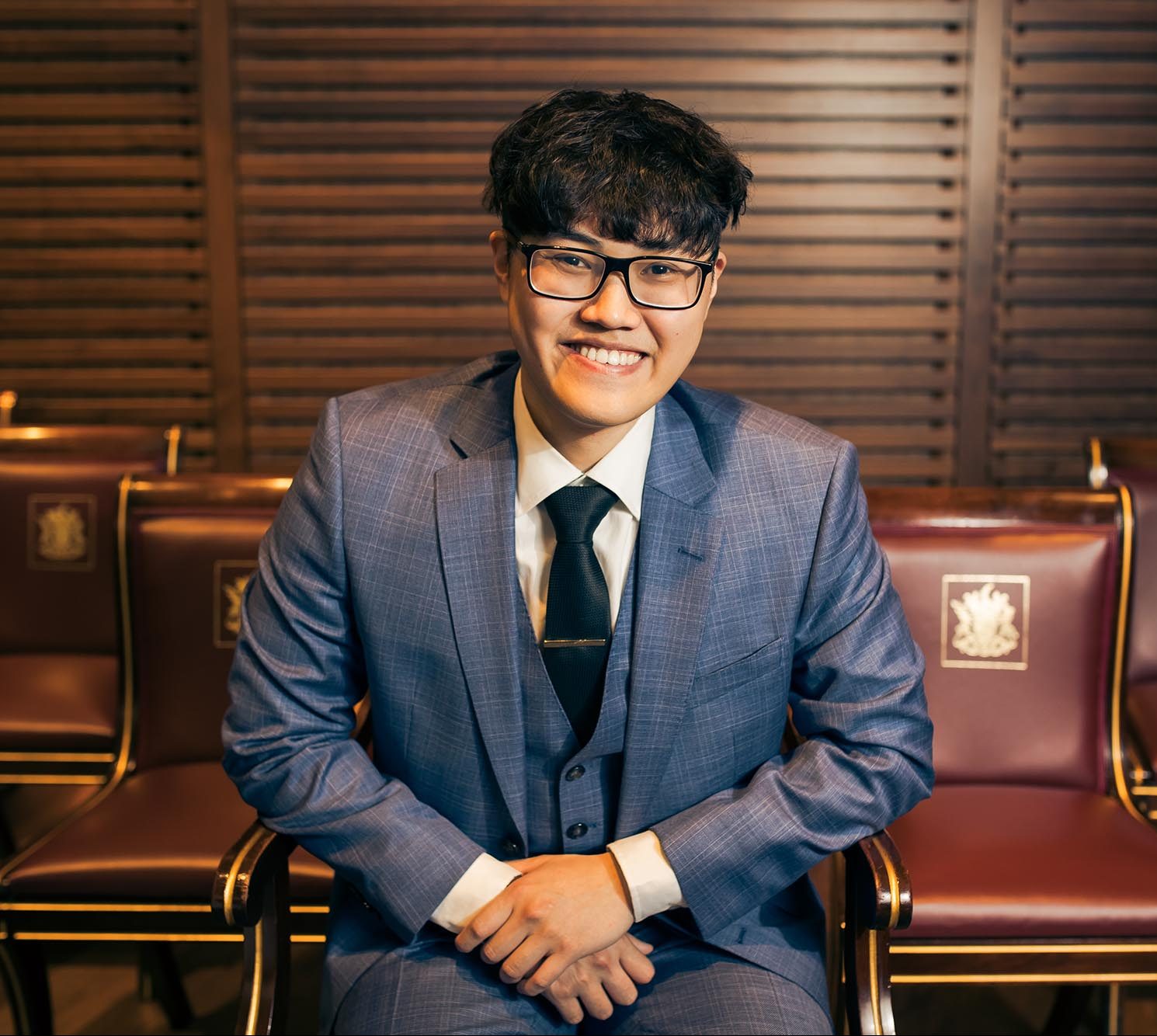
Leathersellers’ Scholarships at Colfe's School
Celebrating the long-term success of the Leathersellers’ Scholarships at Colfe’s School.
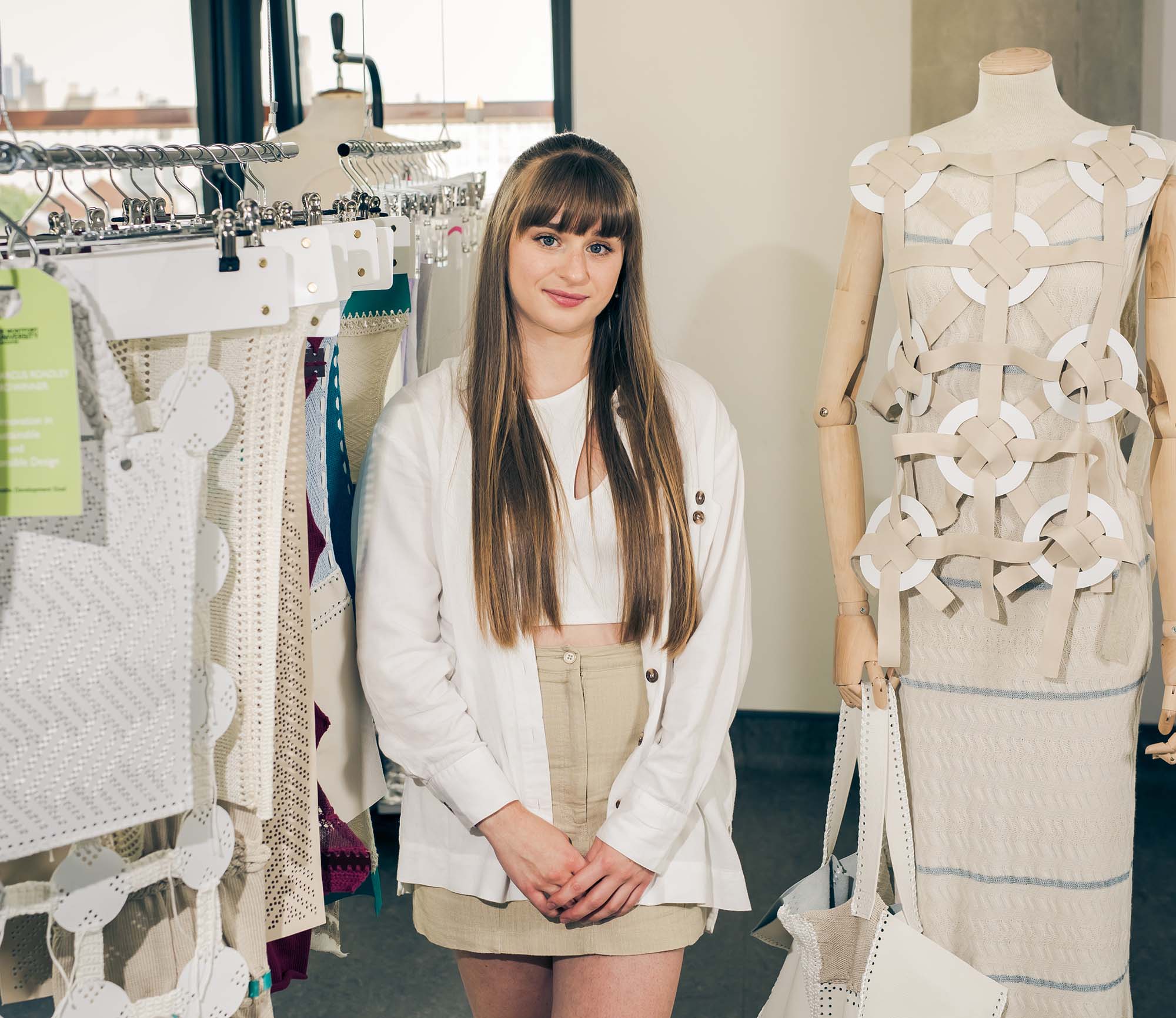
Fashioning History
For an inspired project at Leicester’s De Montfort University, students of “Artifacts Live” are drawing on the lessons of historic leathercraft to create the designs of the future.